- Entertainment
- Events Sports Podcasts Better Planet Better Workplaces Vault Mightier Autos Newsletters Unconventional Vantage Experts Voices
- Subscribe for $1
- Better Planet
- Better Workplaces
- Newsletters
- Unconventional

Every Russian Oligarch Yacht Seized So Far—In Pictures
Before the invasion of Ukraine, the world was a playground for the Russian mega-rich.
Now, Russian oligarchs are struggling to hold on to their wealth, as their private jets and superyachts get seized and their properties impounded as a result of the heavy sanctions much of the world has imposed on the circle of billionaires around Vladimir Putin .
Since the European Union started imposing sanctions on an increasing number of Russian oligarchs, the list of luxury superyachts owned by Russian billionaires seized by authorities has steadily kept on growing.
Here's a breakdown.
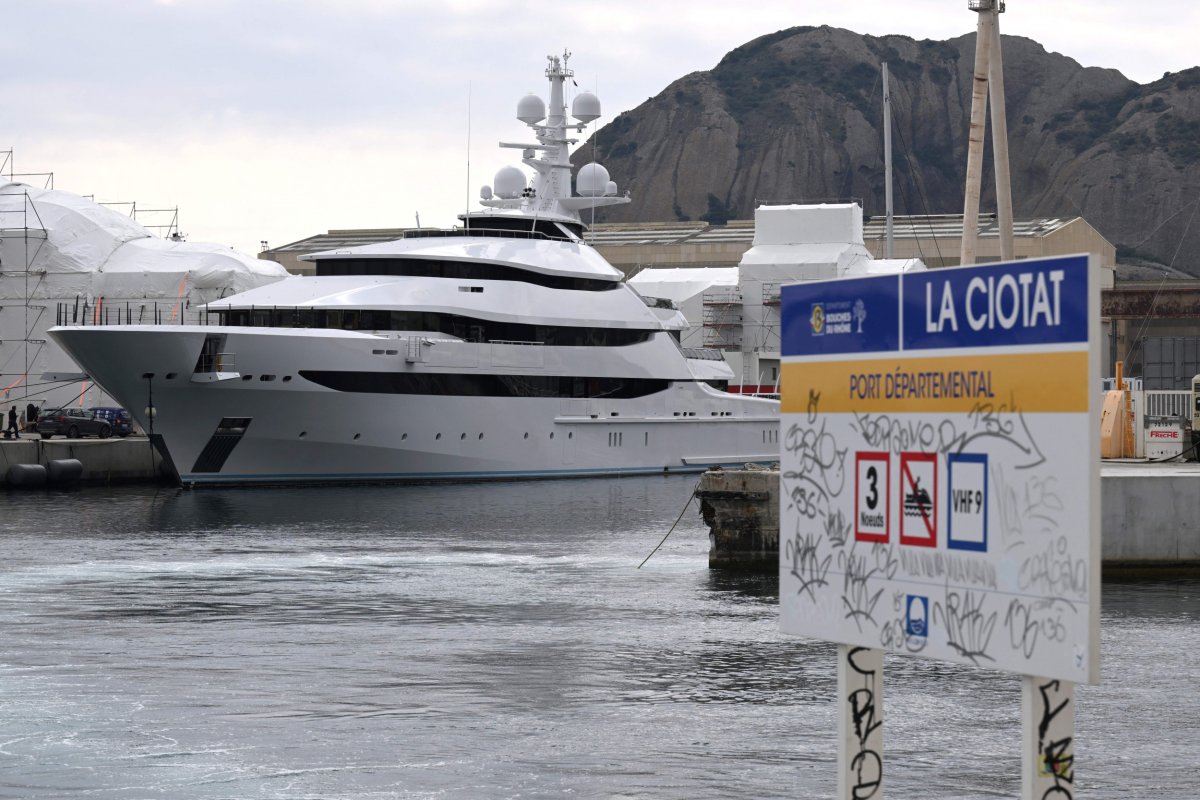
On March 2, French authorities seized a yacht they said belonged to Rosneft's boss Igor Sechin in the Mediterranean port of La Ciotat.
The owner of Amore Vero wasn't formally Sechin, but French authorities said they found him to be the main shareholder.
On the same day, news spread that German authorities had seized a luxury yacht owned by Russian billionaire Alisher Usmanov. But German officials denied that the Dilbar , a $600 million yacht named after the billionaire's mother, had been seized in Hamburg.
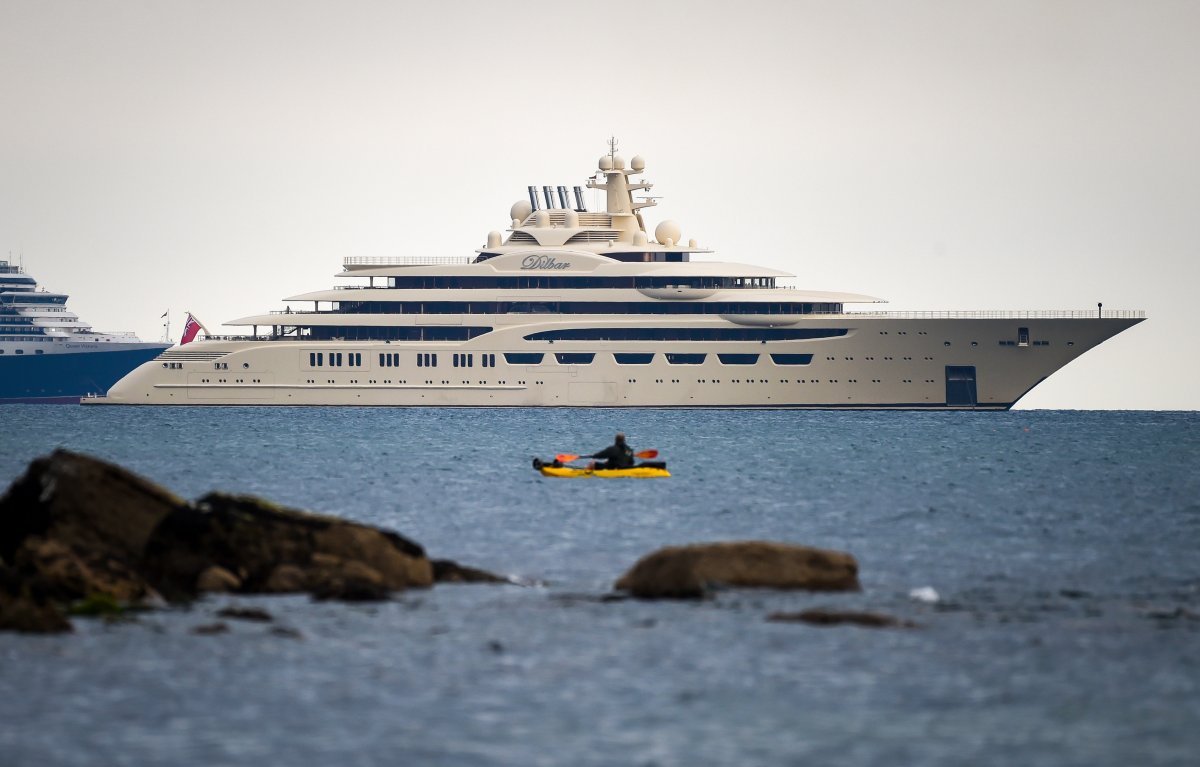
The yacht, over 490 feet long and boasting an 80-foot swimming pool, two helipads and a garden, is now simply blocked in the northern port and is not allowed to leave.
Usmanov is one of the richest men in Russia and the world, with an estimated worth of $14.2 billion. The European Union has frozen his assets and described him as "pro-Kremlin oligarch with particularly close ties to Russian President Vladimir Putin."
On March 14 in Barcelona, Spanish police seized a $140 million yacht belonging to Sergei Chemezov, a former KGB officer who now heads the state-owned defense conglomerate Rostec. Following the seizure, Spanish Prime Minister Pedro Sanchez promised "there will be more."
The Valerie , a 280-foot yacht, is technically registered to Chemezov's stepdaughter Anastasia Ignatova. She is under U.S. sanctions, as is Chemezov and his wife.
The next day, Spanish authorities seized Lady Anastasia , reportedly owned by Alexander Mikheyev, in Mallorca. Mikheyev, director of Russian arms exporter Rosoboronexport, is under EU sanctions.
A day later, Spain seized another yacht believed to belong to Sechin, the 440-foot-long Crescent , in the port of Tarragona in Catalonia.
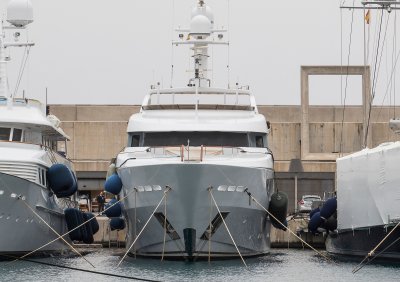
Since the beginning of March, Italy has seized three yachts belonging to Russian oligarchs.
Lady M , owned by steel magnate Alexey Mordashov, Russia's richest man, was seized in the port of Imperia on the same day as Lena , belonging to oil and gas mogul Gennady Timchenko, was seized in the port of Sanremo.
Lady M , formally registered in the Cayman Islands, has been docked in Imperia since January. The yacht is equipped with a beauty salon and a helicopter pad.
Lena , registered in the British Virgin Islands, has been in Sanremo since November 2021.
On March 12, Italian authorities seized Andrey Melnichenko's Sailing Yacht A , a $580 million yacht docked at the port of Trieste. Coal and fertilizer magnate Melnichenko was sanctioned by the EU on March 9.
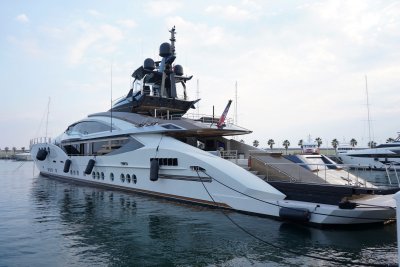
The Ragnar , another superyacht owned by Russian oligarch and former KGB agent Vladimir Strzhalkovsky, wasn't confiscated, but it's stuck in Norway because nobody will sell it fuel to leave.
According to Croatian media reports, Viktor Medvedchuk's 300-foot mega yacht, The Royal Romance, was seized in the bay of Rijeka on Wednesday. Medvedchuk is leader of Ukraine's main pro-Russia party.
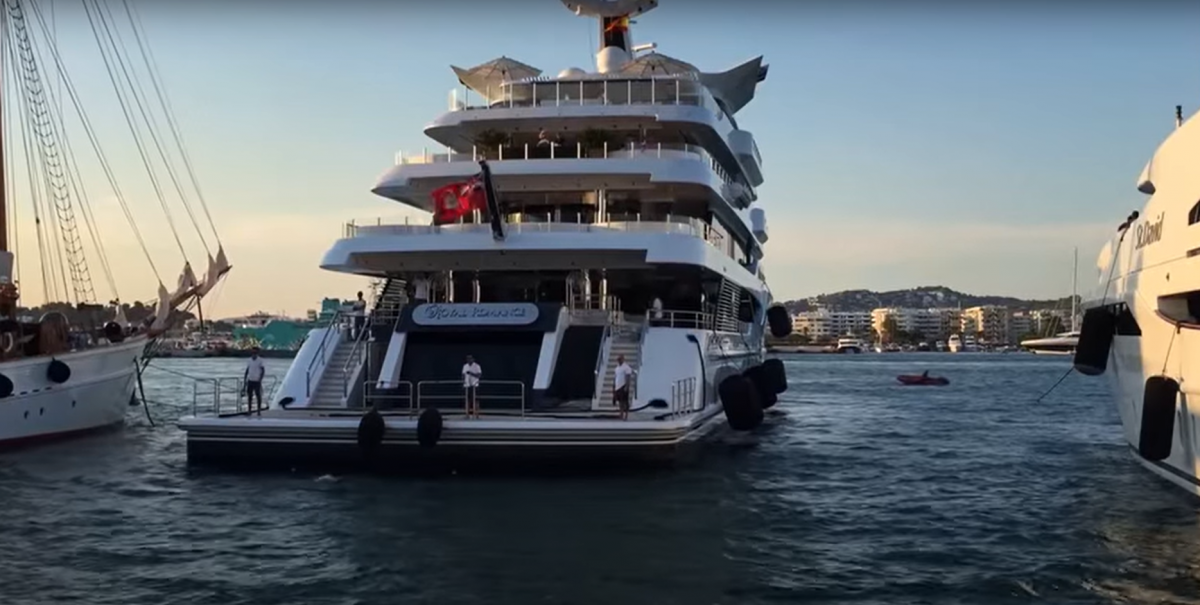
More yachts owned by Russian oligarchs and currently docked around Europe could yet be seized, as not all billionaires have been sanctioned by the EU and the ownership of some yachts is yet to be determined.
Those Russian oligarchs whose yachts haven't been seized are scrambling to take them far away from the grasp of European authorities, although they're running out of safe havens to hide their luxury vessels.
At least five Russian billionaires have moved their yachts to the Maldives as the EU imposed sanctions, ship-tracking data has shown. In early March, five superyachts were reportedly harbored in the Maldives, which doesn't have an extradition treaty with the U.S.
Top stories

Netanyahu Postpones Gaza Ceasefire Deal Over Hamas 'Last Minute Crisis'

ICE Strikes Back

Red 3 Ban: Other Ingredients That Could Now Face FDA Scrutiny

China 'Forced' To Acquire Nuclear Weapons as US Sounds Warning
About the writer.
Giulia Carbonaro is a Newsweek Reporter based in London, U.K. Her focus is on U.S. and European politics, global affairs and housing. She has covered the ups and downs of the U.S. housing market extensively, as well as given in-depth insights into the unfolding war in Ukraine. Giulia joined Newsweek in 2022 from CGTN Europe and had previously worked at the European Central Bank. She is a graduate of Nottingham Trent University. Languages: English, Italian, French. Email: [email protected].
- Work & Careers
- Life & Arts
What happened to Russia’s seized superyachts?

- What happened to Russia’s seized superyachts? on x (opens in a new window)
- What happened to Russia’s seized superyachts? on facebook (opens in a new window)
- What happened to Russia’s seized superyachts? on linkedin (opens in a new window)
- What happened to Russia’s seized superyachts? on whatsapp (opens in a new window)
Miles Johnson
Simply sign up to the Life & Arts myFT Digest -- delivered directly to your inbox.
On the morning of March 29 2022, Captain Guy Booth was working aboard Phi, a 192ft aquamarine superyacht moored in London’s Canary Wharf, when he heard a commotion below. Down on the pier a car had pulled up and Grant Shapps, then the UK’s transport secretary, emerged from the vehicle, followed by a retinue of aides.
“The first thing we saw was his entourage, several men and women carrying clipboards and make-up and hairbrushes,” says Booth.
Shapps and his team then began to shoot a video for the social media network TikTok, where the government minister announced that Phi — built in 2021 by the famed Dutch luxury shipbuilder Royal Huisman and worth an estimated £38mn — “belongs to a Russian oligarch, friends of Putin”.
Booth watched in amazement as several television crews who’d been tipped off about the news arrived at the scene. “Shapps was positioning himself like a big game hunter, checking his best angle,” says Booth. “They took several takes.”
Next, a black cab arrived and three officers from the UK’s National Crime Agency got out. They climbed aboard and handed Booth a brown envelope. Inside was a government order: the boat he captained was now detained for being “owned by persons connected with Russia”.
Video description
A video shot by Grant Shapps in Canary Wharf, which shows the yacht Phi after the order to detain it in London
Today, Phi is still moored in the same spot in Canary Wharf outside an Indian restaurant, and with a small skeleton crew aboard. Each day, Booth, along with two engineers, a chief officer, a crew cook and two deck hands wake up on board and dutifully service the vessel.
Its once feted “infinite wine cellar” and seven-metre swimming pool lie unused. A lonely sun lounger sits out on deck, and the yacht’s Maltese maritime flag droops. Pink paint has been applied to its roof to protect it from the risk of dust from nearby building sites.
Paul Dickie, a lawyer at Jaffa & Co who has represented Phi, claims the boat has been targeted by squatters. A notice on its side warns any would-be trespassers that they will be prosecuted “to the full extent of the law”.
For western nations, the yachts’ fate is a high-stakes test of the effectiveness of sanctions. For the lawyers who work for the owners, these seizures are acts of modern piracy
Phi’s owner, a Russian businessman called Sergei Naumenko, has repeatedly denied any connection to Vladimir Putin or the Russian state, and has twice unsuccessfully appealed to the English courts to have the yacht released.
In May 2023 an English High Court judge said Shapps’s TikTok video claims that the owner had “close connections to Putin” were “excusable political hyperbole”. The Court of Appeal in March this year said it was “troubled” by Shapps’s “incorrect” statements. Both courts, however, upheld the UK detention order for the vessel.
After Putin’s full-scale invasion of Ukraine in February 2022 prompted western governments to unleash an avalanche of economic sanctions against Russian oligarchs, there are now multiple superyachts like Phi trapped in ports around the world. Several are stuck in seemingly never-ending legal quagmires, with vastly expensive lawyers hired by often opaque offshore owners battling for their release.
Although tens of billions of dollars of Russian-owned luxury assets, including mansions, luxury cars and private jets, have been frozen, it was the symbolism of the seizure of the oligarch superyachts — vast, floating Versailles palaces often worth hundreds of millions of dollars — that captured the public’s imagination. Anti-corruption campaigners hoped at the time that these vessels would be auctioned off and the proceeds could be donated to Ukraine.

Yet more than two years on from the start of the war, the future of these superyachts remains unresolved. Once prized trophies in the west’s co-ordinated response to Russia’s aggression, some have racked up vast maintenance costs for taxpayers, had their angry crews turn fire hoses and drones on snooping reporters, and been the target of sabotage plots by anti-war activists.
For western governments, resolving the fate of these superyachts will be a high-stakes test of the effectiveness of economic sanctions. For lawyers working for the oligarchs who own them, the seizures are acts of modern piracy.
Perhaps no single vessel exemplifies the array of headaches that seized superyachts have caused western governments more than the Amadea — a $300mn, 348ft boat detained by the US authorities in Fiji in 2022.
Such is its gaudy opulence that the Amadea could be a pastiche of an oligarch’s fantasies. According to a 2021 profile in Boat International, it boasts a Pleyel piano with 24-carat gold pedals, a swimming pool that converts into a stage for DJs, hand-painted Michelangelo clouds on the dining-room ceiling, a lobster tank and a helipad.

When the US Department of Justice seized the Amadea, it claimed that it was owned by the sanctioned Dagestan-born gold magnate Suleiman Kerimov. The DoJ said he was “part of a group of Russian oligarchs who profit from the Russian government through corruption and its malign activity around the globe”.
Deputy US attorney-general Lisa Monaco announced at the time that the seizure “should tell every corrupt Russian oligarch that they cannot hide”. Not long after Amadea was seized in Fiji, she told the Aspen Security Forum that investigators had even discovered an “alleged Fabergé egg” aboard. It was later found to be an imitation.
The Amadea was then moved by the US authorities from Fiji to San Diego, where it is currently moored. The US government last October brought a civil forfeiture case against the superyacht based on its claim that it was owned by Kerimov.
We have 60,000 litres of diesel on board. If there are problems with fire detection, that could be very dangerous. You can’t get a fire engine in here’ Captain Guy Booth
During the time the Amadea has been stuck in San Diego, it has racked up maintenance bills of $740,000 a month, or almost $9mn a year, to be paid by the US government. Because of this, the Department of Justice moved to try to sell the boat, arguing that the costs it was incurring were “excessive”.
Superyachts require constant maintenance and upkeep to keep their seaworthiness, let alone their value. Crew salaries and vast mooring fees must be paid. Hulls must be scraped, engines must be cleaned.
“The water here is brackish, half freshwater and half seawater, so things grow in it,” Booth says about Phi. “We are constantly having to remove biological marine growth from the filters. The teak decks require constant daily attention.”
Sabotage is also a risk. Lady Anastasia, a yacht seized in Mallorca and owned by the CEO of the Russian arms exporter Rosoboronexport Alexander Mikheev, in February 2022 was almost destroyed by a Ukrainian mechanic working on the boat who tried to intentionally sink it.
Some boats have simply disappeared. In the summer of 2022, two yachts owned by Dmitry Mazepin, another sanctioned Russian billionaire, vanished from the Sardinian port of Olbia. An investigation by Italy’s financial police, which had seized both yachts shortly after Putin’s invasion of Ukraine, found that one had made a stopover in Tunisia before vanishing, while the other was spotted sailing towards Turkey. In response, Italy has hit Mazepin with fines, which remain unpaid.

Booth says he believes Phi has suffered significant damage, as well as lost charter earnings, as a result of being stuck in Canary Wharf. “I am not at liberty to discuss the exact figure,” he says, “but it is huge. We are talking tens of millions of pounds.”
Because of the freezing order, Phi’s Dutch manufacturer is unable to perform warranty work on the yacht. One of many issues, Booth says, is that he has been unable to fix faulty fire protection systems.
“We have 60,000 litres of diesel on board. If there are problems with the fire detection systems, that could be very dangerous. Exceptionally dangerous. You could have an ecological disaster in central London. You can’t get a fire engine in here.”
In Phi’s case, the costs are all borne by its Russian owner, who — unlike many other owners of frozen yachts — is not sanctioned and has not been proven to have any meaningful connection to the Russian state. He will be able to get this money back from the UK government only if the restriction order is overturned and he can then win a successful damages claim.
For other superyachts, the burden of paying for upkeep falls on the countries where they are being held. Lady M, a yacht owned by the sanctioned Russian steel and mining magnate Alexei Mordashov, has been blocked from leaving the Italian port of Imperia as one of seven yachts belonging to Russian oligarchs in the country.

Another, Sailing Yacht A, designed by Philippe Starck and, at 468ft long, one of the largest private sail-assisted motor yachts in the world, is currently impounded in the port of Trieste. Alleged by the Italian state to be owned by the sanctioned Russian oligarch Andrey Melnichenko, the boat is estimated to have cost the Italian taxpayer more than €18mn in upkeep, according to the local newspaper Il Piccolo. Lawyers for Melnichenko have said he does not personally own the yacht, and instead it is controlled by a trust that has no connection to him.
Costs aside, seizing a superyacht is simple enough, provided it is in the right place. At the time of the invasion, the only way for sanctioned Russian oligarchs to protect their yachts was to be lucky or shrewd enough to not have them in territories or waters where they could be captured. In March 2022, two superyachts belonging to Roman Abramovich, one of them featuring an onboard missile defence system and anti-paparazzi “laser shield”, sailed away from Europe towards Turkey and remain free to this day.
But in an industry where it is common to own vessels through cascades of offshore companies and anonymous trusts, a far trickier task for investigators can be to prove in court who really owns a superyacht once it has been detained.
Legal tussles over the ownership of government-seized assets are common. The difference with the superyachts is the owners’ legal resources, the value of the assets and the cost to the taxpayer
In the case of the Amadea, the US government has been battling in court to prove that Kerimov is its true owner before it can be allowed to sell the yacht and stop paying the vast costs of its upkeep.
The Department of Justice appeared to have strong evidence to back up its claims, including records showing that Kerimov’s family spent large amounts of time on the Amadea, and that his children had requested structural modifications to the superyacht.
However, Kerimov denied ownership. Instead, a different wealthy Russian, Eduard Khudainatov, a former chief executive of the Russian state-owned oil company Rosneft, stepped forward to claim that he, in fact, was the true owner of the Amadea and the seizure was unlawful.
“When you need records from overseas, when you are dealing with shell companies in secrecy jurisdictions, or people are hiding behind nominee owners, it’s going to take a long time,” says Stefan Cassella, a former federal prosecutor who served 30 years in the US Department of Justice specialising in asset forfeiture.
Cassella says these sorts of legal tussles over who owns an asset that has been seized by a government are common. The difference in the case of oligarch-owned superyachts is the legal resources available to the owners fighting the seizures, the size and value of the assets, and the cost to the taxpayer of keeping them afloat.
“We litigate this all the time,” Cassella tells me. “Say a drug agent sees a dealer dealing from a Mercedes car and they want to seize it. He claims it’s not his car, that his mother or sister owns it. We then need to litigate with that person to see if they are really the owner. Who pays the insurance? Who brought it in to get oil changed? Whose garage is it sitting in? This is the same, just on a much larger scale.”
The US responded in a court filing to Khudainatov’s claim to own the Amadea by accusing him of being a “clean, unsanctioned straw owner” serving as a front for Kerimov. Khudainatov’s lawyers have denied he is a straw owner and say he is the legal owner of the yacht.
The picture was further muddied when it was alleged by the US in court documents that Khudainatov, who in June 2022 was placed under EU sanctions, was the fake owner of another, even more valuable and mysterious super yacht, the Scheherazade — which he has denied.
The Scheherazade, one of the longest yachts in the world, worth an estimated $700mn, was seized by the Italian authorities in the Tuscan port of Marina di Carrara in May 2022 because of its suspected “meaningful economic and business connections with prominent elements of the Russian government subject to EU sanctions”.

In 2022 the now deceased Russian opposition leader Alexei Navalny’s Anti-Corruption Foundation published an investigation that claimed that the Scheherazade was in fact owned by Putin himself, based on the fact that many of its crew were agents of the Federal Protective Service, a state security unit responsible for the Russian president’s personal safety.
The US authorities have argued it is impossible that one man could own so many yachts, writing in court documents that “there is no reason to believe [Khudainatov] has the financial resources to purchase the Amadea and the Scheherazade, or is there any apparent reason why a single individual would own multiple superyachts of their size”.
Whoever is the true owner of the Scheherazade, they have not let its seizure dim their ambitions. During the time it has been held in Tuscany, the Italian government has allowed the owner to pay for an expensive refurbishment. It is a decoration job that the owner clearly wants to conduct in privacy. When reporters from Radio Free Europe tried to get close to the vessel earlier this year the Scheherazade’s crew turned on fire hoses, and deployed a drone to follow them.
Meanwhile, last month a New York court ruled that the US government was not allowed to sell the Amadea, meaning that US taxpayers will have to continue for now to foot the bill for its upkeep.
Even if governments are able to establish ownership and get court permission to sell a superyacht, further legal complexities can make finding a buyer difficult. In June 2023 the Alfa Nero, a yacht alleged to be owned by the US-sanctioned phosphate billionaire Andrey Guryev, which has been impounded in Falmouth Harbor, Antigua, was sold at auction for $67mn to former Google chief executive Eric Schmidt.
The deal later fell apart, with the US ambassador to Antigua announcing that Schmidt backed out of the purchase because he was worried about future legal problems if he bought it.
Yulia Guryeva-Motlokhov, Guryev’s daughter, this year launched a challenge to the Antiguan government’s decision to seize and sell the Alfa Nero, claiming that she is the sole beneficiary of the trust that owns the yacht, rather than her father. The case is expected to be heard in September.
Back in the UK, Booth, the captain of Phi, believes that the yacht and its owner have been unfairly caught up in events outside of their control. “He’s not a billionaire, he’s never met Putin,” Booth says of Phi’s owner Sergei Naumenko. “He’s against the war. He’s just a private Russian gentleman who likes boats.”
Phi will make another bid to be freed in the UK’s Supreme Court, in an appeal to be heard next January.

Captain Booth says he will not desert his ship. “My team and I have remained on board, remained loyal. I’ve won numerous awards for what I do in my industry. I could have left almost straight away, and said, ‘This is not my bag, I’m off to captain another superyacht in the Med’ . . . I would not sleep well at night if I abandoned this owner.”
But Booth and his crew may be waiting a long time. Cassella, the forfeiture lawyer, says he expects many cases to drag on for as long as a decade. “I thought two years ago when all the superyachts were seized that 10 years was an appropriate timeframe,” he says. “This is not going to be resolved any time soon.”
Miles Johnson is an investigative reporter for the FT. His book ‘Chasing Shadows: A True Story of Drugs, War and The Secret World of International Crime’ is now out in paperback
Find out about our latest stories first — follow FT Weekend on Instagram and X , and subscribe to our podcast Life & Art wherever you listen

Promoted Content
Follow the topics in this article.
- Life & Arts Add to myFT
- Government of Russia Add to myFT
- The Weekend Essay Add to myFT
- Miles Johnson Add to myFT
Insiders still have no idea what's going to happen to Russian oligarchs' seized superyachts
- It's been two years since Russia invaded Ukraine, leading to sanctions against Russian oligarchs.
- Many of their superyachts were seized or frozen , leading industry insiders to question their fate.
- The yachts, some of which are worth hundreds of millions of dollars, remain in a state of limbo.
More than two years after Russia invaded Ukraine, the boating world still doesn't have many answers about what's going on with the very large, expensive elephants in the sea: oligarchs' superyachts .
The war prompted many governments to enact sanctions against Russia's richest , including seizing their superyachts worth hundreds of millions of dollars. But it's unclear whether they can be sold or who'd buy them, leaving ports peppered with massive boats stuck in a floating limbo.
"The Russian problem, it's becoming a bigger and bigger and bigger problem," one luxury yacht broker told Business Insider at the Palm Beach International Boat Show last week. Like many others, he requested not to be named, given the sensitive nature of the matter at hand and the generally discreet nature of the industry.
Russia has been a massive player in the massive boat market for a long time. In August 2021 — about six months before Russia's Ukraine invasion — Russians owned the second-largest share of yachts over 40 meters in length, according to a report from the industry publication SuperYacht Times.
They were responsible for 16% of new build superyacht purchases in the decade preceding the report and are known for splashing out on extravagant interiors and unique features. (One builder BI spoke to recalled a mandate from an oligarch for a large safe in the owner's cabin in which he could keep his rifles. The builder later learned he'd use them to skeet shoot on deck.)
But those sales have now screeched to a halt as oligarchs get hit by international sanctions. At least a dozen superyachts — worth well over $1 billion combined — have been affected.
And no one is quite sure what will happen to them.
Russia's sanctioned superyachts are hard to buy and sell
The first problem is that many of the yachts are "frozen" — not seized. That means that although the Russian owners can't operate or collect them, they don't technically belong to an overseas government, so they can't be sold without special permission.
Earlier this month, federal prosecutors petitioned a judge asking for consent to sell the Amadea, the 106-meter superyacht that has been docked in San Diego and costs the US as much as $922,000 a month to maintain.
"I've had some inquiries, but all you can tell them is we don't know the outcome yet" of the case, another superyacht broker told BI at the yacht show.
And despite the broker's claim of interest in yachts like Amadea , most ultrarich — or at least their brokers — don't want to go near the vessels with a ten-foot pole, even if the government does get legal permission to sell them.
"How does it look if you bought a Russian boat?" Julia Simpson, a broker at Thompson of Monaco, said. "Even if it's completely legal and normal, there are too many things on the line," she said, like how the original owner got their money and whether that could make the new buyer look bad.
There are also possible legal implications, as it's hard for the government to prove who actually owns the yachts.
"Oligarchs typically structure their ownership of these high-value assets through a web of offshore shell companies and trusts that is designed to conceal the true owner," Joshua Naftalis, a former federal prosecutor who now works for Pallas Partners, told BI.
And if the government does assume ownership, it's highly dependent on court orders. For example, a Russian whose yacht had been seized by the French government regained access to his boat after winning a legal battle in 2022.
"It's a very difficult process to buy them," Ralph Dazert, the head of intelligence at SuperYacht Times, told BI. "There is a high risk of the former (Russian) owner suing you to get the boat back."
He pointed to the Alfa Nero, the 82-meter yacht that Eric Schmidt planned to purchase for $67 million last year in an auction put on by Antigua and Barbuda. He backed out after various parties tried to block the sale, likely deeming it not worth the legal headache.
"When the reason for sanctioning goes away, which it may do," the Russian owners will try to get their boats back , Simpson said. After all, "the government's not going to pay them."'
That said, if sanctions are dropped, the yachts will be worth much less than when they were seized, as a boat not in use deteriorates much faster than one sailing the seas.
"Those yachts need to be used to be kept in shape, kept in condition," the second broker said. "Just having them sit at the dock with a temporary crew on board is not good for the boats."
And the sanctioned Russians who have managed to maintain control of their superyachts won't have an easy time offloading them in the future.
Americans who try to do business with sanctioned oligarchs would have a number of hoops to jump through — like finding a bank to process the purchase, which would be next to impossible. If somehow they did and the government caught wind, they'd face hefty penalties and the transaction would be void.
So Russia's richest have found themselves "stuck" sailing in a select few countries that will let them, like the Maldives, Montenegro, and Dubai.
- Main content

An official website of the United States government
Here's how you know
Official websites use .gov A .gov website belongs to an official government organization in the United States.
Secure .gov websites use HTTPS A lock ( Lock Locked padlock ) or https:// means you’ve safely connected to the .gov website. Share sensitive information only on official, secure websites.
- The Attorney General
- Organizational Chart
- Budget & Performance
- Privacy Program
- Press Releases
- Photo Galleries
- Guidance Documents
- Publications
- Information for Victims in Large Cases
- Justice Manual
- Business and Contracts
- Why Justice ?
- DOJ Vacancies
- Legal Careers at DOJ
- Our Offices
Archived Press Releases
Archived News
Para Notícias en Español
$300 Million Yacht of Sanctioned Russian Oligarch Suleiman Kerimov Seized by Fiji at Request of United States
Fijian law enforcement executed a seizure warrant freezing the Motor Yacht Amadea (the Amadea), a 348-foot luxury vessel owned by sanctioned Russian oligarch Suleiman Kerimov. Fijian law enforcement, with the support and assistance of the FBI, acted pursuant to a mutual legal assistance request from the U.S. Department of Justice following issuance of a seizure warrant from the U.S. District Court for the District of Columbia, which found that the Amadea is subject to forfeiture based on probable cause of violations of U.S. law, including the International Emergency Economic Powers Act (IEEPA), money laundering and conspiracy.
The U.S. Treasury Department’s Office of Foreign Assets Control designated Kerimov as part of a group of Russian oligarchs who profit from the Russian government through corruption and its malign activity around the globe, including the occupation of Crimea. In sanctioning Kerimov, the Treasury Department also cited Kerimov as an official of the Government of the Russian Federation and a member of the Russian Federation Counsel.
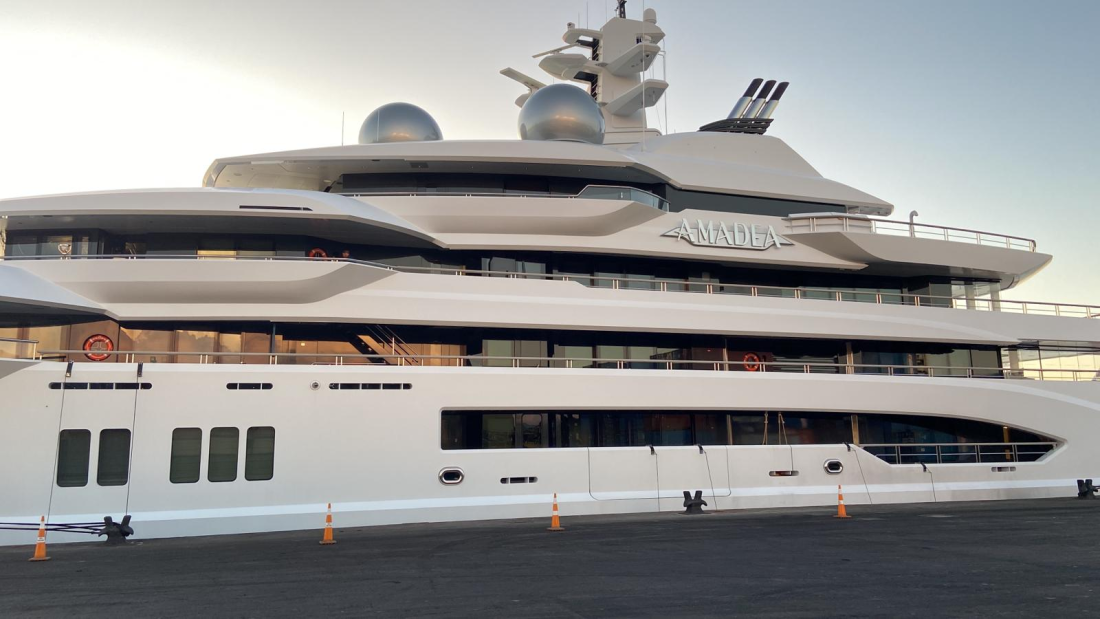
According to court documents, Kerimov owned the Amadea after his designation. Additionally, Kerimov and those acting on his behalf and for his benefit caused U.S. dollar transactions to be routed through U.S. financial institutions for the support and maintenance of the Amadea.
“This ruling should make clear that there is no hiding place for the assets of individuals who violate U.S. laws. And there is no hiding place for the assets of criminals who enable the Russian regime,” said Attorney General Merrick B. Garland. “The Justice Department will be relentless in our efforts to hold accountable those who facilitate the death and destruction we are witnessing in Ukraine.”
“Last month, I warned that the department had its eyes on every yacht purchased with dirty money,” said Deputy Attorney General Lisa O. Monaco. “This yacht seizure should tell every corrupt Russian oligarch that they cannot hide – not even in the remotest part of the world. We will use every means of enforcing the sanctions imposed in response to Russia’s unprovoked and unjustified war in Ukraine.”
“This seizure demonstrates the FBI's persistence in pursuing sanctioned Russian oligarchs attempting to evade accountability for their role in jeopardizing our national security,” said FBI Director Christopher Wray. “The FBI, along with our international partners, will continue to seek out those individuals who contribute to the advancement of Russia’s malign activities and ensure they are brought to justice, regardless of where, or how, they attempt to hide.”
“This seizure of Suleiman Kerimov’s vessel, the Amadea, nearly 8,000 miles from Washington, D.C., symbolizes the reach of the Department of Justice as we continue to work with our global partners to disrupt the sense of impunity of those who have supported corruption and the suffering of so many,” said Director Andrew Adams of Task Force KleptoCapture. “This Task Force will continue to bring to bear every resource available in this unprecedented, multinational series of enforcement actions against the Russian regime and its enablers.”
“The U.S. Marshals Service will continue to contribute our expertise in support of Task Force efforts to take possession of seized assets of Russian oligarchs during these forfeiture operations,” said Director Ronald L. Davis of the U.S. Marshals Service.
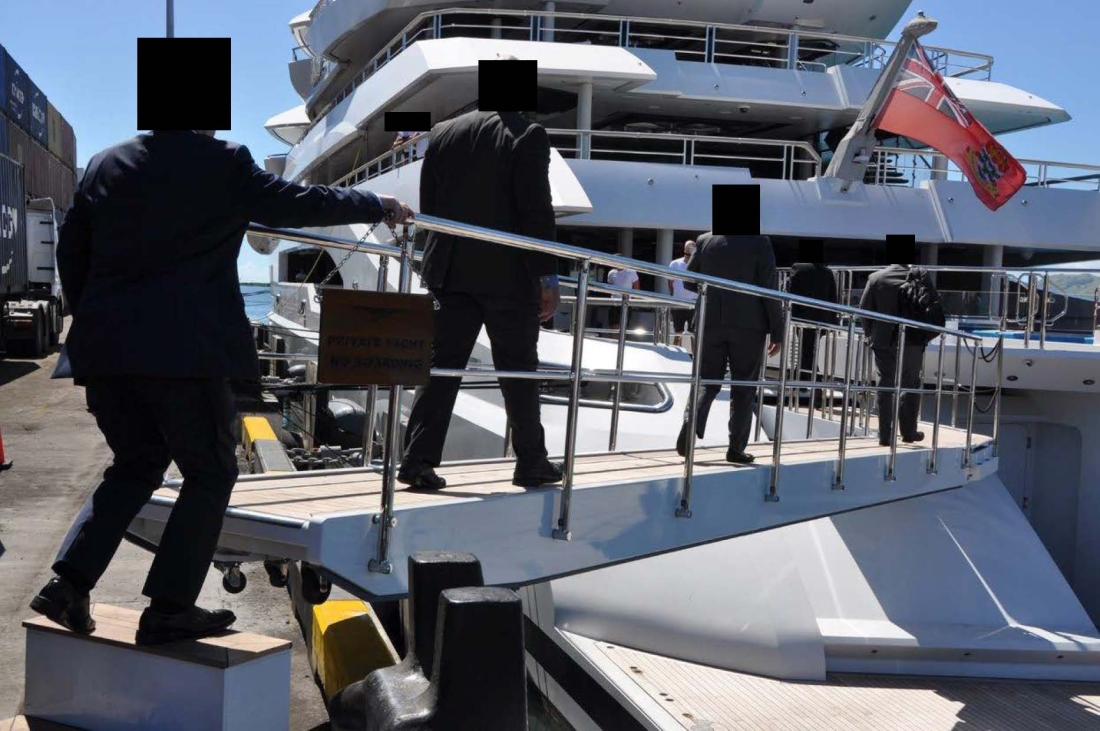
The seizure was coordinated through the Justice Department’s Task Force KleptoCapture, an interagency law enforcement task force dedicated to enforcing the sweeping sanctions, export controls, and economic countermeasures that the United States, along with its foreign allies and partners, has imposed in response to Russia’s unprovoked military invasion of Ukraine. Announced by the Attorney General on March 2 and run out of the Office of the Deputy Attorney General, the task force will continue to leverage all of the department’s tools and authorities to combat efforts to evade or undermine the collective actions taken by the U.S. government in response to Russian military aggression.
Upon receipt of a mutual legal assistance request from the United States, Fijian authorities executed the request, obtaining a domestic seizure warrant from a Fijian court.
The Amadea, International Maritime Organization number 1012531, is believed to be worth approximately $300 million or more. The yacht is now in Lautoka, Fiji.
This matter is being investigated by the FBI’s New York Field Office with assistance from the FBI Legal Attaché Office in Canberra, Australia, the Department of State’s Diplomatic Security Service, and the U.S. Embassy in Suva, Fiji.
Trial Attorney Andrew D. Beaty of the National Security Division’s Counterintelligence and Export Control Section and Trial Attorney Joshua L. Sohn of the Criminal Division’s Money Laundering and Asset Recovery Section are handling the seizure. The Justice Department’s Office of International Affairs, the U.S. Attorney’s Office for the District of Columbia, Customs and Border Protection, and the U.S. Marshals Service provided significant assistance. The United States thanks the Fijian authorities for their cooperation in this matter.
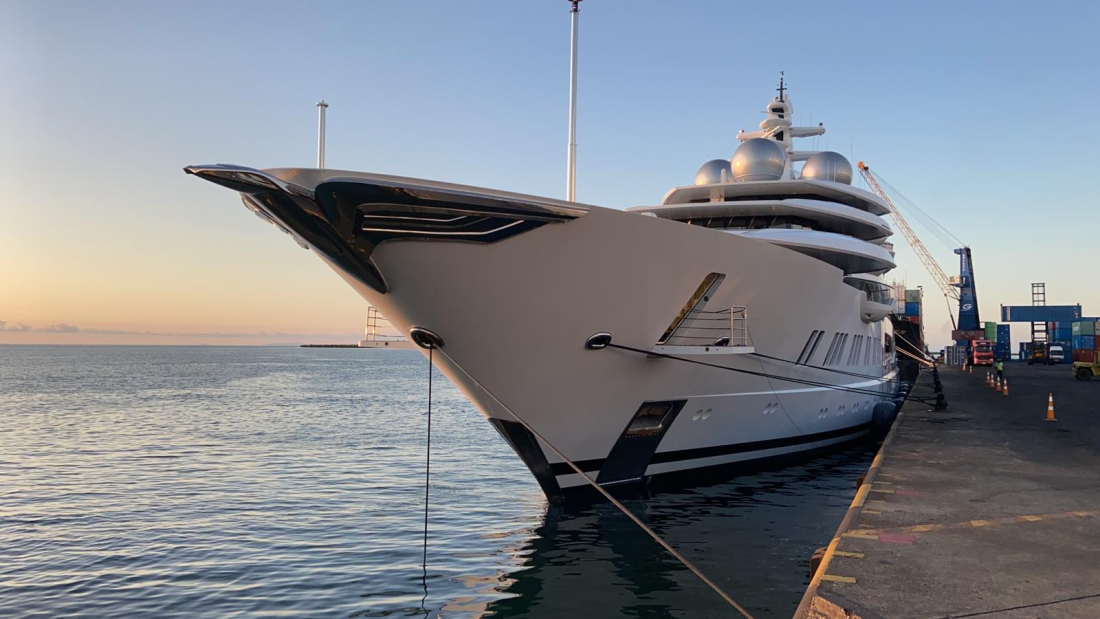
Related Content
The Justice Department announced today that the Madoff Victim Fund (MVF) began its 10th and final distribution of over $131.4 million to victims of the Bernard L. Madoff fraud scheme...
Klaus Pflugbeil, 59, of Ningbo, China, was sentenced today to 24 months in prison for conspiring to send trade secrets that belong to a leading U.S.-based electric vehicle company (Victim...
On Nov. 20 in the District of Oregon, Sanjay Kaushik, 57, of India, was indicted for conspiring to export controlled aviation components with dual civilian and military applications to end...
Morning Rundown: Israel delays vote to approve Gaza ceasefire, Biden leaves office with a warning, and L.A.'s long road to rebuilding
- Editors' picks
- Culture & Trends
- Share & Save —
- Decision 2024
- Investigations
- Tech & Media
- Video Features
- NBC Asian America
- Los Angeles
- Dallas-Fort Worth
- Philadelphia
- Washington, D.C.
- South Florida
- Connecticut
- Nightly News
- Meet the Press
- NBC News Now
- Nightly Films
- Special Features
- Newsletters
More From NBC
- NBCU Academy
- NEXT STEPS FOR VETS
- NBC News Site Map
Follow NBC News
news Alerts
There are no new alerts at this time
- Latest Stories
- Gaza ceasefire
- Confirmations
Russian oligarch's yacht costs U.S. taxpayers close to $1 million a month
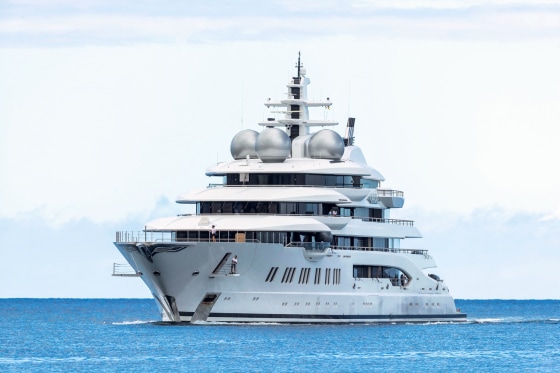
A mega-yacht seized by U.S. authorities from a Russian oligarch is costing the government nearly $1 million a month to maintain, according to new court filings.
The U.S. Department of Justice is seeking permission to sell a 348-foot yacht called Amadea, which it seized in 2022, alleging that it was owned by sanctioned Russian billionaire Suleiman Kerimov. The government said it wants to sell the $230 million yacht due to the “excessive costs” of maintenance and crew, which it said could total $922,000 a month.
“It is excessive for taxpayers to pay nearly a million dollars per month to maintain the Amadea when these expenses could be reduced to zero through [a] sale,” according to a court filing by U.S. prosecutors on Friday.
The monthly charges for Amadea, which is now docked in San Diego, California, include $600,000 per month in running costs: $360,000 for the crew; $75,000 for fuel; and $165,000 for maintenance, waste removal, food and other expenses. They also include $144,000 in monthly pro-rata insurance costs and special charges including dry-docking fees, at $178,000, bringing the total to $922,000, according to the filings.
The battle over Amadea and the costs to the government highlight the financial and legal challenges of seizing and selling assets owned by Russian oligarchs after the country’s invasion of Ukraine. European Commission President Ursula von der Leyen said last week that the European Union should use profits from more than $200 billion of frozen Russian assets to fund Ukraine’s war effort.
Her comments echoed government calls in the spring of 2022 to freeze the yachts, private jets and mansions of Russian billionaires in hopes of putting pressure on Russian President Vladimir Putin and raising money for the war effort.
Yet, nearly two years later, the legal process for proving ownership of the Russian assets and selling them has proven to be far more time-consuming and costly. In London, Russian billionaire Eugene Shvidler has waged a court battle over his private jets that were impounded, and Sergei Naumenko has been appealing the detention of his superyacht Phi.
The battle over Amadea began in April 2022, when it was seized in Fiji at the request of the U.S. government, according to the court filings.
Though the U.S. alleges that the yacht is owned by Kerimov, who made his fortune in mining, attorneys for Eduard Khudainatov, an ex-Rosneft CEO who has not been sanctioned, say he owns the yacht, and have sought to take back possession of the vessel.
In court filings, Khudainatov’s attorneys have objected to the U.S. government’s efforts to sell the yacht, saying a rushed sale could lead to a distressed sale price and that the maintenance costs are minor relative to the potential sale value.
Khudainatov’s attorneys refuse to pay the ongoing maintenance costs as long as the government pursues a sale and forfeiture. However, they say their client will reimburse the U.S. government for the more than $20 million already spent to maintain the yacht if it’s returned to its proper owner.
In court papers, the government says Kerimov disguised his ownership of Amadea through a series of shell companies and other owners. They say emails between crew members show Kerimov “was the beneficial owner of the yacht, irrespective of the titleholder of the vessel.”
The emails show that Kerimov and his family ordered several interior improvements of the yacht, including a new pizza oven and spa, and that between 2021 and 2022, when the boat was seized, “there were no guest trips on the Amadea that did not include either Kerimov or his family members,” according to the court filings.
The government also says Kerimov has been trying to sell Amadea for years, so a sale would be in keeping with his intent.
“This is not a situation in which a court would be ordering sale of a precious heirloom that a claimant desperately wishes to keep for sentimental reasons,” the government said in filings.
Even if Amadea were sold quickly, the proceeds wouldn’t automatically go to the government. Under law, the money would be held while Khudainatov and the government continue their battle in court over the ownership and forfeiture.
More from CNBC:
- Powell reinforces position that the Fed is not ready to start cutting interest rates
- Bill Gates-backed startup confident it can unearth more buried treasure after a historic copper find
- OpenAI shares Elon Musk emails urging startup to raise $1 billion, see Tesla as a cash cow

IMAGES
COMMENTS
Mar 17, 2022 · As part of an international pressure campaign on Russia, authorities from around the world have seized more than a half-dozen superyachts belonging to billionaire oligarchs allied with...
Mar 17, 2022 · Since the European Union started imposing sanctions on an increasing number of Russian oligarchs, the list of luxury superyachts owned by Russian billionaires seized by authorities has...
Apr 27, 2022 · This interactive tracks seized and frozen assets around the world that are linked to sanctioned Russian oligarchs and entities.
Mar 6, 2024 · The US government is spending nearly $1 million a month to maintain a luxury superyacht seized from a sanctioned Russian oligarch as part of the Justice Department’s effort to put pressure on...
Aug 20, 2024 · In the U.S., the Justice Department tried to move the ownership of the Amadea, the yacht it seized, through a legal procedure called civil forfeiture, sell it and send the proceeds to...
Jul 20, 2024 · After Putin’s full-scale invasion of Ukraine in February 2022 prompted western governments to unleash an avalanche of economic sanctions against Russian oligarchs, there are now multiple...
Mar 26, 2024 · It's been two years since Russia invaded Ukraine, leading to sanctions against Russian oligarchs. Many of their superyachts were seized or frozen, leading industry insiders to question their...
Jul 21, 2022 · Fijian law enforcement executed a seizure warrant freezing the Motor Yacht Amadea (the Amadea), a 348-foot luxury vessel owned by sanctioned Russian oligarch Suleiman Kerimov.
Mar 6, 2024 · The U.S. Department of Justice is seeking permission to sell a 348-foot yacht called Amadea, which it seized in 2022, alleging that it was owned by sanctioned Russian billionaire Suleiman...
Feb 12, 2024 · The U.S. government said it is spending more than $7 million a year to maintain a superyacht it seized from a sanctioned Russian oligarch, and urged a judge to let it auction the vessel...